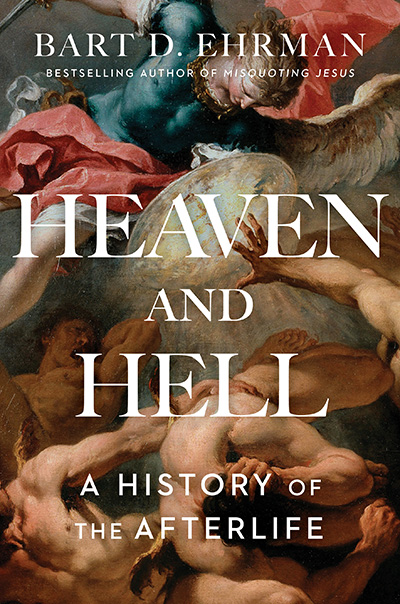
Join us for the third in a fascinating six-week series of
virtual “book club” discussions!
This week join NHC president Robert Newman and scholar Bart D. Ehrman to discuss Ehrman’s book, Heaven and Hell: A History of the Afterlife

Wednesday, May 6, 2020 at 7:00 pm ET
Facebook Live
_________________________________________________________________
Where do our ideas about heaven and hell come from,
and why do they endure?
_________________________________________________________________
 In clear and compelling terms, Bart D. Ehrman recounts the long history of the afterlife, from the Epic of Gilgamesh to the writings of Augustine, focusing especially on the teachings of Jesus and his early followers. He discusses ancient guided tours of heaven and hell, in which a living person observes the sublime blessings of heaven for those who are saved and the horrifying torments of hell for the damned. As a historian, Ehrman obviously cannot provide a definitive answer to the question of what happens after death, but by helping us reflect on where our ideas of the afterlife come from, he assures us that even if there may be something to hope for when we die, there is certainly nothing to fear.
In clear and compelling terms, Bart D. Ehrman recounts the long history of the afterlife, from the Epic of Gilgamesh to the writings of Augustine, focusing especially on the teachings of Jesus and his early followers. He discusses ancient guided tours of heaven and hell, in which a living person observes the sublime blessings of heaven for those who are saved and the horrifying torments of hell for the damned. As a historian, Ehrman obviously cannot provide a definitive answer to the question of what happens after death, but by helping us reflect on where our ideas of the afterlife come from, he assures us that even if there may be something to hope for when we die, there is certainly nothing to fear.
You can view the presentation HERE. However, to participate in the discussion via Facebook Live, a Facebook membership is required. A recording of the discussion will be available both on the Center’s Facebook page and on the NHC website.
_________________________________________________________________
 The National Humanities Center is one of the world’s leading centers for advanced study and the only independent institution of its kind dedicated exclusively to the humanities. For over four decades, the Center has encouraged excellence in scholarship and teaching while constantly affirming the vital importance of the humanities in American life.
The National Humanities Center is one of the world’s leading centers for advanced study and the only independent institution of its kind dedicated exclusively to the humanities. For over four decades, the Center has encouraged excellence in scholarship and teaching while constantly affirming the vital importance of the humanities in American life.
_________________________________________________________________
Heidi Camp
Vice President, Institutional Advancement
The National Humanities Center
7 T W Alexander Drive, Durham, NC 27709 | (919) 549-0661


I very much enjoyed reading the book. As always, you are a great communicator! For me the excursions into the development of afterlife concepts in Greek thought and how it informed post-Jesus Christianity was especially new and enlightening.
What I would have found fascinating as well is how Rabinnic Judaism later evolved its own afterlife ideas, where Gehenna no longer is the valley in Jerusalem but post-mortem realm of punishment. I would assume that this is where the Islamic Jahannam, whose torments are depicted very graphically in the Quran comes from. The one upside of Jahannam is that (at least for Muslims) it is imagined as temporary. It would be fascinating to pursue how hell concepts of the tree Abrahamic religions influence each other from late Antiquity on.
Also, interestingly, Buddhist hell concepts (called “Naraka”)seem to predate all of them. I guess that interaction is not very likely, but it is worth a look under which conditions a belief system develops concepts of justice, reward and punishment in the afterlife. Maybe a suggestion for a future but. Or maybe that book already exists somewhere, it probably does.
Dr. Ehrman:
I have a question regarding The Gospel of Matthew, Chapter 8:5-13, in which Jesus cures the Roman centurion’s slave. In those verses, Jesus scolds the Israelites, adding that “the children of the kingdom shall be cast out into utter darkness.” (King James version). To boot, he compares the Israelites unfavorably with the Roman occupier. Now I hear that this gospel was written for a Jewish audience. If its purpose is to make an appeal to Jews, I’m wondering what the writer was thinking by writing these things?! I can’t imagine Jewish people responding well to this. What are your thoughts?
I don’t think it was written to a Jewish audience. It was written to a group of Christians, some of whom may *come* out of a Jewish environtment, but who are in serious conflict with Jews who are not followers of Jesus. See chapter 23 for example! Pretty vitriolic.
Thank you! The view that the Matthew gospel was not intended for a Jewish audience is not what I’ve heard. I belong to a small group of Christians and Jews who are currently reading this gospel together, and the view that Matthew *was* directed towards Jews has been an assumption. I’d very much appreciate if you can direct me to any sources suggesting it was directed to Christians. I’d like to discuss this issue further with the group, which, by the way, is led by a rabbi and a pastor. And thanks again!
Oh, there is not doubt that it was written for Christians. There is no one who disputes that. The question is whether these followers of Jesus were from Jewish stock or pagan, before becoming followers. One reason for the latter — the view I hold — is that when Jesus, in matthew’s Gospel, explains how his followers have to keep the law, he refers to ethical laws that would be applicable to everyone, Jew or Gentile (don’t murder, don’t commit adultery, don’t dishonor parents) but he does not ever refer to those laws that were seen as identity markers for Jews (observing Sabbath, keeping kosher, circumcising males, etc.) So he appears to be speaking to broad audience, not just Jews (i.e., Jewish followers)
Thank you very much! Much appreciated.
Harold
Dr Bart’ erhman. First of all I really want to thank you for giving me free membership to this blog for over 2years now. Thank you so much.
Now my question is this, looking at the historical events that took place before the time of Jesus particularly some of the events narrated in the book of Maccabees- where seven brothers and there mother were all tortured to a gruesome death for refusing to violate God’s law and believing in some kind of recompense on the judgement. The Gospel seems to portray Jews in different light.
1. Why are these books( Maccabees and the rest) which are more historical not added to the Bible?
2. How and where did the idea that one has to believe in Jesus to be saved developed?
3. It’s very obvious that the idea of life after death (resurrection) wasn’t new in Jewish society even though the Gospels try to portray it so.
Did christains see the tale of the courageous seven brothers and their mother tortured to death as any form of threat to the character of Jesus?
1. They are in the apocrypha, but were written too late to be considered as part of the Hebrew Bible; 2. Long story: but as soon as Jesus’ followers came to think he got raised from the dead they though that God must have meant his death as a kind of sacrifice for others; so this belief arose right away; 3. The New Testament clearly show that many Jews did believe in a future resurrection (most except the Sadducees); and as to the Maccabean martyrs, the normal view is that knowing stories like that helped Christians find ways of describng and narrating the death of Jesus as a martyr for the sins of others, in ways that Jews in their world would resonate with (not as a threat to their views)
Dr Bart is it true that it was the church that decided which books to be canonized?
There was never a vote, but yes, the Christians decided for themselves. (What option would there be?)
Christopher Hitchens, Sam Harris, David Wolpe & Bradley Artson debate: Is there an afterlife?
https://www.youtube.com/watch?v=UjKJ92b9Y04
Last Great Dabate About An Afterlife.
Have fun before Your event.
Best Regards
Thanks Bart,
Can you please extend the free membership until June 3 to a few months more, at least until everything is back to normal? I have a couple of relatives and friends who just found out about this and asked me to ask on their behalf.
If not, I am still extremely grateful for you doing this trial.
Whenever they join they will be granted two-month’s free membership.
Dear Bart,
My question is about the “critical historical method” applied to the new testament. Multiple atestation and temporal proximity seem to be obvious but have them been tested with scientific rigor, for example, in controled lab events?
My question arises because even if there is multiple atestation or temporal proximity, authors may get it all wrong still. Or, for example, the texts that got it right were lost forever or may not even have existed.
When there is a saying os Jesus in the testament, to mind mind, is virtually impossible to say that Jesus really said that, with that exact words.
Thanks a lot!
Gustavo
I’m afraid historians do not have controled lab events. The natural sciences and history are dealing with fundamentally different things and so cannot proceed along the same way. You can’t repeat the experiment of history, so teh scientific method is inapplicable. But there are other ways to establish high levels of probabilyt, You can’t “scientifically” prove that Washington crossed the Deleware, because you cannot replicate the exact same experiment.
Some apologists admit that the Bible does not hold up to modern standards of accuracy – that source-based history is a modern idea. But I don’t buy that all ancient readers didn’t care that what they were reading wasn’t 100% accurate.
So for example, when “Matthew and Luke” were writing their genealogies, did they believe what they were writing was accurate? Was there really a sense that it was okay to “be creative” with history and make stuff up?
My sense is that neither of them simply made up the genealogies out of whole cloth, but that they passed along traditions they had heard. There’s no way to tell whether the traditions started in an innocent way of story telling (as happens all the time) or if someone intentionally fabricated something she or he knew was bogus. My sense is that the writers believed what they were telling was accurate. That did indeed matter to most ancients, when it came to telling about the past, even if they lacked our particular standards and methods.
Dr Bart Erhman can we say the idea of a spiritual enemy was developed as a result of the believe in the idea that man is a Spiritual being? ( A look at the the scriptures from old testament to new testament reveals that there was a shift from a physical enemy to a spiritual enemy)
There are certainly spiritual powers in the Old Testament as well, and my sense is that for nearly as long as people couldn’t understand the material world around them (that is, for virtually all of history), they assumed something they could not see was controlling things (e.g., the weather)
For the people who missed the event live (like me), here a direct link to the video:
https://www.facebook.com/NationalHumanitiesCenter/videos/577181669362823/?type=2&theater